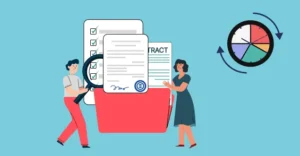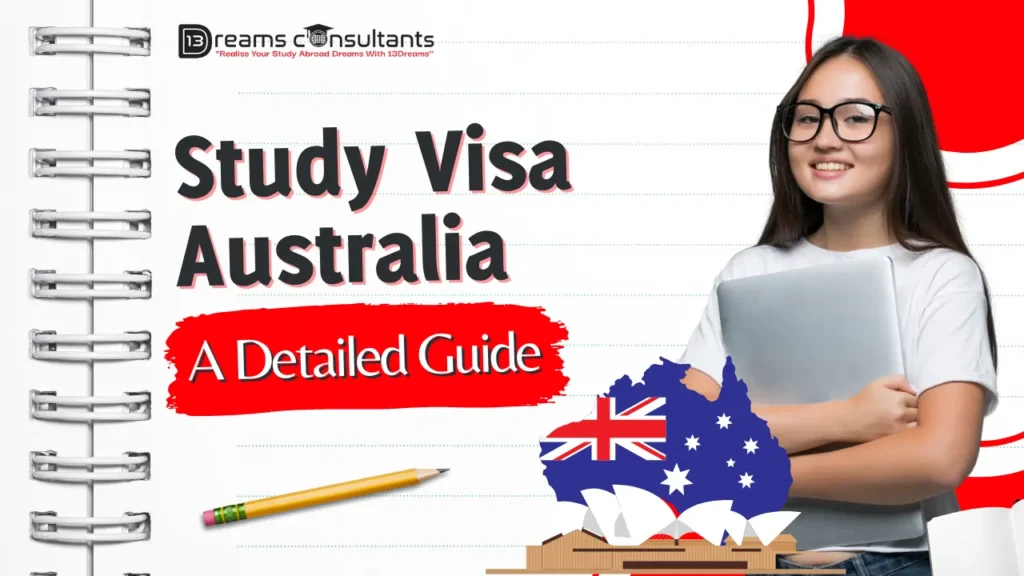Dreaming of studying in Australia? You’re not alone! From its top-ranked universities to its breathtaking landscapes, Australia is a global hub for higher education. However, the visa application process can be daunting, especially with the many documents required.
Whether you’re fresh out of high school, aiming for your bachelor’s or master’s, or even pursuing further studies, our detailed guide will walk you through the 12 essential documents you’ll need for a successful Australian student visa application.
By following these steps, you’ll streamline the process and set yourself up for a smooth transition to your academic adventure in Australia.
Why Documents Matters?
Think of your Australian student visa application like a puzzle. Each document is a crucial piece, and without all of them fitting together perfectly, the picture (your visa approval) remains incomplete.

The Department of Home Affairs (the Australian government agency responsible for visas) is meticulous in its assessment. Thorough documentation demonstrates that you:
- Meet the eligibility requirements: Your academic transcripts, English test scores, and CoE prove you’re academically qualified and have been accepted into a legitimate course.
- Have genuine intentions: Your GTE statement and financial evidence show that you truly intend to study and have the means to support yourself during your stay in Australia.
- Pose no risk: Your character documents and health insurance demonstrate that you are of good character and won’t be a burden on the Australian healthcare system.
Why Thorough Documentation Speeds Up Your Visa:
The Australian government processes thousands of student visa applications each year. When you provide all the required documents, clearly organized and easy to assess, you make their job easier.
This directly translates to a faster processing time for your visa. Incomplete or inaccurate documents, on the other hand, trigger delays. Visa officers may need to request additional information or clarification, which adds weeks or even months to the process.
Consequences of Incomplete or Inaccurate Documents:
- Visa refusal: This is the worst-case scenario. If you don’t provide all the necessary documents or if your information is incorrect, your visa may be denied outright. You’ll then have to start the application process all over again, which is time-consuming and expensive.
- Delays in processing: Even if your visa is eventually approved, missing or inaccurate documents will significantly slow down the process. This could mean missing your course start date, losing your enrollment, or facing unnecessary stress and uncertainty.
- Reputation damage: Providing false or misleading information can damage your reputation and credibility with the Australian government. This could impact future visa applications or travel plans to Australia.
The 12 Essential Documents
Your documents are your ticket to studying in Australia. Here’s a 12 essential documents you’ll need for an Australian study visa:
- Valid Passport: Your passport should be valid for at least 6 months beyond your period of stay in Australia. It’s one of the primary identification documents required for your visa application.
- CoE (Confirmation of Enrolment): This is an official document issued by the educational institution confirming your acceptance into a course. It’s crucial as it proves you have a place to study, which is a requirement for the student visa.
- Academic Transcripts & Certificates: These are records of your academic performance and qualifications. You’ll need certified copies, and if they’re not in English, officially translated versions.
- English Proficiency Test Scores (IELTS, TOEFL, etc.): Depending on the course and institution, you’ll need to meet certain English language requirements, demonstrated through tests like IELTS or TOEFL.
- Genuine Temporary Entrant (GTE) Statement: This is a personal statement that explains your reasons for studying in Australia and your intention to return home after your studies. It should be convincing and align with your circumstances.
- Financial Evidence: You must provide evidence of sufficient funds to cover tuition fees, living expenses, and travel. This can include bank statements, evidence of scholarships, or financial sponsors.
- Health Insurance (OSHC): Overseas Student Health Cover is mandatory health insurance for international students. It’s important as it covers potential medical expenses during your stay.
- Character Documents (Police Certificates): These prove you have no criminal record. They’re required for all applicants 16 years and older and can be obtained from the police authorities in your home country.
- Passport-Sized Photographs: You’ll need a few recent photographs that meet the Australian visa photo specifications.
- Visa Application Form: Filling out your visa application form accurately is vital. Ensure all information is correct and corresponds with the documents you’re submitting.
- Additional Documents (if applicable): Depending on your situation, you may need to provide additional documents like proof of work experience, marriage certificates, etc.
- Proof of Welfare Arrangements (if under 18): If you’re a minor, you’ll need to provide details of your welfare arrangements in Australia, such as guardianship or accommodation plans.
Make sure to check the latest requirements from the official Australian Government Department of Home Affairs website or consult with an immigration advisor, as visa policies can change. Good luck with your application!
Documents Required for 12th Pass Students
For 12th pass students from India looking to pursue their education in Australia, here are the documents generally required for the Australian Study Visa application:
- Academic Transcripts: Your 12th-grade mark sheets and certificates, which should be attested by the respective educational board or council.
- English Language Proficiency: Evidence of English proficiency through standardized tests like IELTS, TOEFL, or PTE, with scores meeting the criteria set by the Australian Department of Home Affairs and the educational institution.
- Statement of Purpose (SOP): A well-crafted SOP that explains your educational goals, choice of course, and reasons for wanting to study in Australia.
- Passport: A valid passport with at least six months validity beyond your intended stay in Australia.
- Confirmation of Enrolment (CoE): Once you have been accepted into a course, the institution will issue a CoE, which is necessary for the visa application.
- Financial Evidence: Proof of sufficient funds to cover tuition fees, living expenses, return airfare, and other costs associated with studying in Australia.
- Overseas Student Health Cover (OSHC): Evidence of health insurance coverage for the duration of your stay in Australia.
- Parental Consent: If you are under 18 years of age, you will need a signed consent form from your parents or legal guardians.
- Australian Values Statement: A signed statement that you agree to respect the Australian way of life and comply with Australian laws.
- Four Recent Passport-Sized Photographs: Make sure they meet the Australian visa photo requirements.
It’s crucial to check the specific requirements of the Australian embassy or consulate, as well as the university or educational institution you plan to attend, as there may be additional documents or specific forms needed. Preparing these documents meticulously will help ensure a smoother visa application process.
Documents Required for Undergraduate Programs
For international students applying to undergraduate programs in Australia, the following documents are typically required:
- Completed Application Form: A fully filled application form specific to the university and course you’re applying for.
- Academic Transcripts: Official transcripts from your previous educational institutions, including high school certificates or equivalent qualifications.
- English Language Proficiency: Proof of English proficiency through exams like TOEFL, IELTS, or PTE, especially if you’re from a non-English speaking country
- Financial Evidence: Proof of sufficient funds to cover tuition fees, living expenses, and other costs associated with studying in Australia.
- Passport: A valid passport that remains valid throughout your period of study.
- Australian Senior Secondary Certificate of Education (Year 12) or Equivalent: For those who have completed their education outside of Australia, an assessment will be made to determine equivalency.
- Course Prerequisites: Meeting any additional academic requirements necessary for application to your preferred undergraduate degree, such as prerequisite subjects or tests.
- Statement of Purpose (SOP): A personal statement outlining your reasons for choosing the course and your future career plans.
- Letters of Recommendation (LOR): Letters from academic or professional referees who can attest to your suitability for the course.
- CV/Resume: A detailed resume outlining your academic achievements, work experience, and any extracurricular activities.
It’s important to check with the specific university for any additional requirements or variations in the document list. Meeting the minimum entry requirements does not guarantee selection, so ensure your application is comprehensive and well-prepared.
Documents Required for Postgraduate Programs
For students aiming to enroll in postgraduate programs in Australia, the following documents are generally required for the Australian Study Visa application:
- Completed Application Form: A duly filled application form for the chosen university and postgraduate program.
- Academic Transcripts: Official transcripts from your undergraduate degree and any other relevant higher education qualifications.
- English Language Proficiency: Proof of English proficiency, usually through IELTS, TOEFL, or PTE scores, as per the requirements of the university and the visa regulations.
- Financial Evidence: Documentation proving you have the financial capacity to cover tuition fees, living expenses, and other costs while studying in Australia.
- Passport: A valid passport that will remain valid for the duration of your stay in Australia.
- Curriculum Vitae (CV): An updated CV detailing your academic background, work experience, research, publications, and any other relevant information.
- Research Proposal: If you are applying for a research-based postgraduate program, a detailed research proposal outlining your study plan, methodology, and expected outcomes.
- Supervisor Agreement: Confirmation from a faculty member at the Australian institution who has agreed to supervise your research.
- Statement of Purpose (SOP): A personal statement that clearly articulates your reasons for pursuing postgraduate studies, your research interests, and your career objectives.
- Letters of Recommendation (LOR): Typically two or more LORs from academics or professionals who can vouch for your academic and research capabilities.
- Confirmation of Enrolment (CoE): Issued by the educational institution once you have been accepted into the program, which is necessary for the visa application.
- Overseas Student Health Cover (OSHC): Proof of health insurance that meets the requirements set by the Australian government.
- Australian Values Statement: A signed statement affirming that you will respect the Australian way of life and comply with Australian laws.
It’s important to note that specific requirements may vary depending on the university and the course of study. Always check with the Australian embassy or consulate and the educational institution for the most current and detailed list of required documents. Preparing these documents carefully will facilitate a smoother application process for your Australian Study Visa.
The Visa Application Process
Here’s a brief overview of the Australian study visa application process:
- Online vs. Paper Applications: Most applicants will use the online application system, which is more convenient and often processes applications faster. Paper applications are still accepted but may have longer processing times.
- Processing Times: These can vary depending on the type of visa, the volume of applications, and individual circumstances. It’s important to apply well in advance of your intended travel date to accommodate any delays.
- Potential for Interviews: While not always required, some applicants may be asked to attend an interview. This could be to clarify details in your application or to ensure you meet the Genuine Temporary Entrant requirement.
Remember to check the official Australian Government Department of Home Affairs website for the most current information and consider consulting with an immigration advisor for personalized guidance.
Conclusion
As you embark on your journey to study in Australia, remember that meticulous preparation is your greatest ally. A well-organized and complete visa application not only expedites the process but also demonstrates your commitment and readiness to thrive in the Australian education system.
To recap, the 12 essential documents you’ll need are:
- Valid Passport
- Confirmation of Enrolment (CoE)
- Academic Transcripts & Certificates
- English Proficiency Test Scores
- Genuine Temporary Entrant (GTE) Statement
- Financial Evidence
- Overseas Student Health Cover (OSHC)
- Character Documents (if applicable)
- Passport-Sized Photographs
- Visa Application Form
- Additional Documents (if applicable)
- Proof of Welfare Arrangements (if under 18)
Resources:
- Department of Home Affairs Website: The official source for all visa-related information: https://immi.homeaffairs.gov.au/visas/getting-a-visa/visa-listing/student-500
- Document Checklist Tool: Use this handy tool to confirm the documents you need: https://immi.homeaffairs.gov.au/visas/web-evidentiary-tool
A Final Word of Encouragement:
Don’t let the visa process deter you from pursuing your academic dreams in Australia. By following this guide, utilizing the resources provided, and seeking professional assistance if needed, you can navigate the application confidently and efficiently.
Australia awaits! With its world-class education, diverse culture, and abundant opportunities, it’s a destination that promises an enriching and unforgettable study experience. Start your preparation today, and soon you’ll be on your way to a brighter future.



